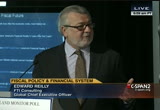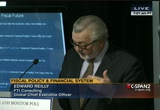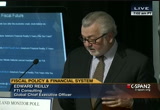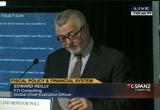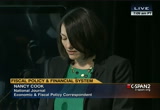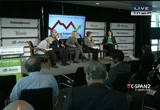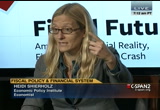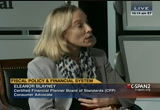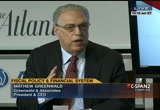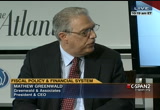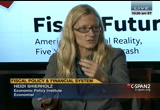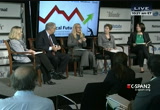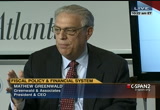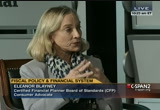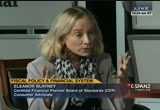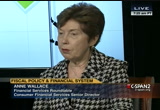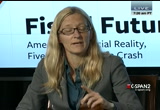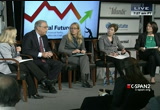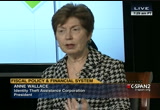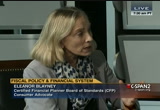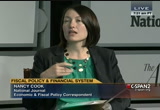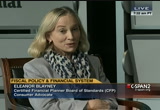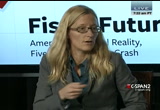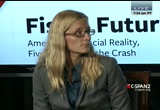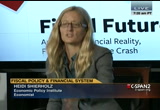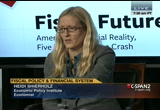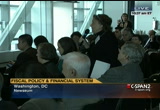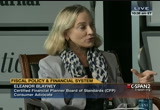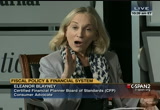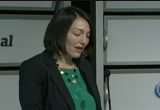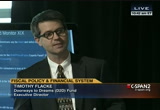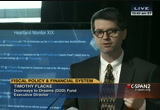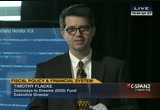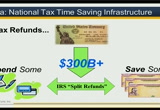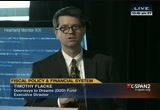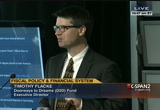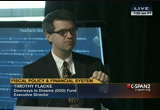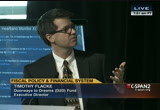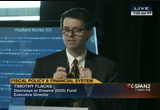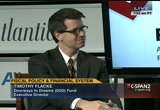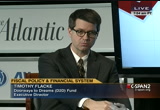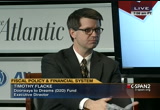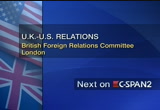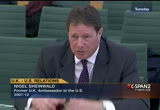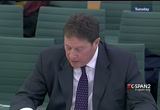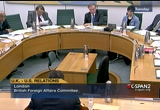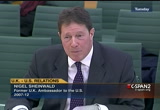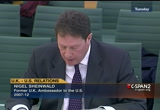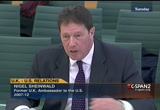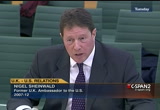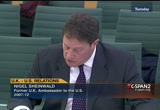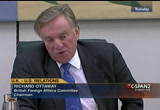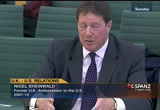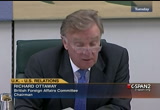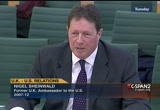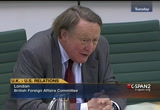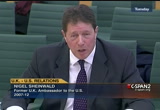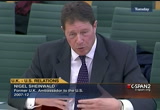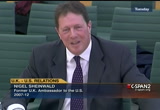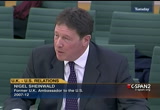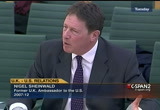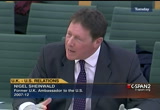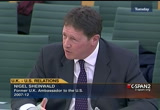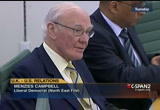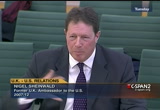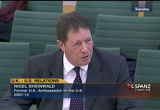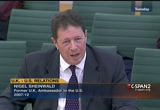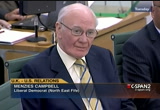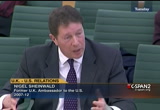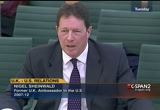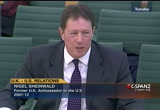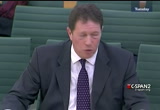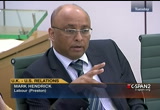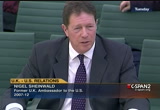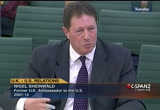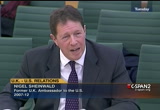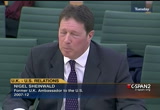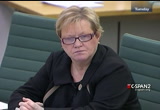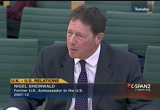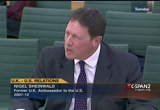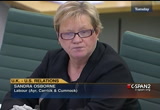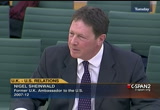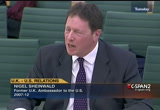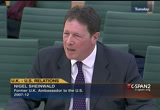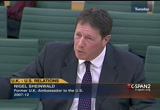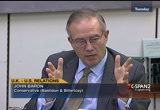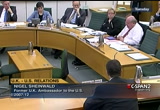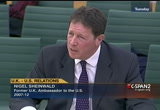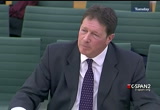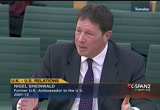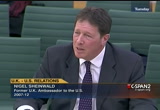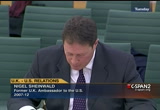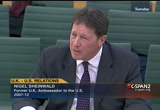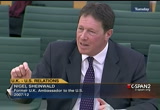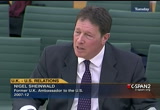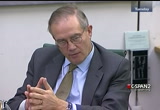tv Key Capitol Hill Hearings CSPAN November 22, 2013 10:00am-12:01pm EST
10:00 am
demographic breaks and interesting, the most confident group are those with full-time workers come household of $50,000 a year but do not have a college degree and also retirees at 71%. we spoke about earlier. they are into executing the plan. so in overwhelming majority of the retiree households, 71% say that they are confident they have a solid plan and they are executing on that. so again you see on the margins of those that are in lower income households were those that are having not full participation in the labor force, these issues of concern about their long-term planning is quite pronounced. we ask that question in terms of financial regulation, transparency and financial institutions. are you looking to get increased information what is the best way
10:01 am
to go about this? is it that they should put an increased pressure on companies to offer more information, 32% roughly one third? the federal government should require the regulatory answer, 31% )-close-paren third. the financial services company this should be just an issue of competition that the market will sort this out with 28%. i just draw the ideological break on this. you see 43% of democrats support the regulatory fix that is the most popular with them and you see with republicans and the 37% most supportive of the market fix that competition should bring about better performance by businesses. finally turning a little bit to how americans believe the function that we are seeing in washington dc and the stalemate around the budget and fiscal issues, gdb leave the federal government situation on the deficit and the national debt affects your personal financial
10:02 am
situation, almost three of four americans believe basically this affects them a great deal or somewhat. only 26% say they are sort of not impacted by that fact. we asked do you believe the federal government situation has a positive effect, no affect on your personal financial situation, 62% say that this has a negative impact on them. only 37% say that this has no effect, excuse because 26% say that it has no effect o, and 11% say positive. i don't know who they are. finally, and what you believe is the most likely impact on you of the large federal budget deficit and debt in terms of your own personal financial situation, and again what i would throw your eye to is the two top scorers far and away they worry about the higher taxes, lower
10:03 am
disposable income in fewer opportunities for jobs or the wage increases. so again, the issue of disposable income into the household they feel is greatly challenged by this current set of circumstances. i hate to leave you want something that's not very optimistic, but the final slide is that looking into the future in the near-term future in terms of where we are, how confident are you that the congress' ability to reach a budget agreement to avoid another shutdown before the january deadline, 73% of americans are not confident, and that cuts across all political party identification and alternate graphic groups. there is very little confidence that this will be congress going forward on this. and that obviously have an impact on the only political attitudes but also consumer behavior. with that, we are going to show
10:04 am
10:05 am
middle class. we have a mortgage and we have a car payment but we are able to pay everything off each month. >> i would rate of her family financial situation as good. >> i am married. i just had a baby. there are a lot of thoughts with being a new parent. >> we can go out and say i want to buy this new shirt. i know people that can't do that. >> i have to consider what i pay for lunch, when i buy gas, i'm sure that a lot of americans have to do that. >> i'm pretty confident that i know everything i need to know to make the right financial decisions. >> i am definitely very concerned about planning for my retirement. >> i feel that people should contribute to their retirement if they have the opportunity. >> i wouldn't have enough savings to last me six months if i didn't work. i would have enough to last maybe a month and a half.
10:06 am
>> i have enough savings. >> i would be alright a couple of months. >> i definitely do not have enough savings to last. my husband works seven days a week and if he were to lose his job it would be devastating. >> it's important to pay off my debt each month. it's like my anxiety if something isn't paid i get really stressed out about that. i do hope to get ahead that we will eventually come and i know that we will eventually pay down any debt. >> we have over $100,000 in student loans. >> i feel the country is headed in the wrong interaction. >> the country is in the wrong direction. >> i don't approve of the job barack obama is doing. >> he is following with a congress that is so completely difficult. >> i think that congress is doing an inexcusably bad job. >> they all argue. >> i think we are still in a
10:07 am
recession. there is no growth. unemployment is off the charts. >> i feel that most people that have a degree would be able to find work and at this point it seems that regardless what degree you have, you are out of work. >> in the next year the u.s. economy will pretty much -- >> i hope by next year it will start to get better. >> i hear it's supposed to be improving but i can tell you how many around me are unemployed and struggling. >> the federal deficit affects us in a personal weight permanently because everything is related to everything trade. >> [inaudible] >> it's more difficult to get a salary of its more difficult to get the benefits. >> the most likely impact of the deficit is fewer job opportunities. >> hopefully in my lifetime it will get better but i fear for my children if this continues to go the way it is. they will have it really rough.
10:08 am
>> it definitely affects many people in the country. >> it will cause people to lose trust or a sense of security in our government. >> i think the federal shutdown -- i think that the disappointed people even further. >> i.e. juicy optimism for the future of america. we all just need to get on the same page. >> i would say optimism for we persevere and keep going. we don't give up and pretty much stick together. i think that will get us through. >> there's a lot of negative news. the country is going downhill. it's the american spirit to stay positive and always try to find a silver lining and make lemonade from lemons. it's who we are as people. we can't focus on anything negative and really try to find the positive. that's what gets us through.
10:09 am
>> just aggregated into those numbers. it's my job to turn it over to nancy cook from the national journal. [applause] >> hi, everyone. thanks so much. before we get to this outstanding panel that we have, we want to get some audience participation on how people are feeling about some of the numbers. we would like to give the audience in opportunity to weigh in on the monitor poll by asking a couple questions and you can text your answer to 22333 or tweet @poll. what is the way americans can improve their personal financial situations? so the first response is through their own personal efforts paying off debt and making sound investments, and if that is the answer that you believe, text
10:10 am
664812222333, or tweet 64 is 812. significant reduction in the federal budget deficit and debt. if that's the answer you prefer, text 664813 to 22333 or tweet 64813 to @poll. >> they will be in real tim rean the screen behind me. this is pretty cool. it looks like the majority of people here think -- it looks like the top one way and it's
10:11 am
interesting and goes along with what we heard in the polls. i want to introduce a panelist. they are wonderful and i'm excited to welcome them. we have a consumer advocate and a certified financial planners board. we have matthew greenwald, the president and chief executive officer greenwald research. we have an economist at the economic policy institute, and we have and wallace who is a senior director of consumer financial services and president of the identity theft corporation of the financial services roundtable. so thanks for joining us. [applause] there's so much to dig into. one thing that came out through the polling is that americans feel very frustrated about their financial futures, even though the recession technically ended
10:12 am
a few years ago. you are anti-communist. can you give us some sense of why this is happening? >> i wasn't surprised at all to see the big shift of people who still think that we are in a recession. we are officially out of the recession. it officially ended in june of 2009. >> how long ago was that? >> four years ago. but since that time we have seen very little improvement. so instead of this we are all going to die. co. of 2009, we've been adding jobs for just enough to hang on to keep up with a working population so we fall off this cliff and we have been at the bottom of the deep hole for that entire time. >> we are not in a recession
10:13 am
where it's so slow it's surprising people are not feeling like it's improving it's just improving so slowly )-right-paren. >> there is a significant out of job uncertainty when people feel like they are losing their jobs it needs to be feeling of insecurity and the economy isn't serving them well. >> i found how confident people were in their ability to guide their own financial futures and the fact they felt like they could get advice from family and friends. eleanor, as a financial planner is that a good idea? were you surprised by that? >> though i really am not. we are very aware of this at the board in terms of people do go to their family and friends to ask for advice. but i think that we are also aware that people went to their friends to hire bernie made --
10:14 am
madoff. we need an option and that is a major priority of the board to increase the standard of professionalism in the financial planning industry. so people do go to their family and friends but they also go to themselves. we thought that was interesting in the polls. but to me it may be the same issue if i were to ask how many of you are above average drivers you would find more than 50% of you would raise your hand but if you are a statistician you know that the answer is you're not. people are confident in their abilities and maybe they are then they should be. people do need advice and it's our job at the board to make
10:15 am
sure that his top advice. >> if i could pick up on that i was surprised a little bit by the confidence that people said they had in the other 30 to make financial decisions. but i feel it is an opportunity which some of the companies are member companies to leverage social media to get the information out in the community of people they trust so we have seen a number of new financial advisory tools that are based on a sort of seed of good information into whether it is facebook or some of the more specific social media groups and allowing people to have access to sound information so it's not just what you pick up at the barbershop sort of thing that really good solid information from financial planners.
10:16 am
>> absolutely. the speaker made a distinction between financial literacy and financial decision-making and there is no question people need more financial information. they need to understand the basic vocabulary and concepts of personal finance. but what is also needed is the judgment. and while you have that baseline of information, you also need the capability to put that information together to apply it to a specific individual and make a prudent judgment. many people are not necessarily capable of doing that. we cannot do our own brain surgery and in many cases we need someone to help us with tax choices and investments and retirement planning. >> one question i have is since so much of financial planning is being left to individuals, the
10:17 am
polls shows that very few people, struggling under a think that 37% had employee sponsored and they are responsible for picking their health care, do you think that businesses and employees are going to have to step in and help people do that more? >> we are seeing that both employers and the financial services companies that help manage the funds are provided more information and at a more accessible format. obviously you can't sit somebody down and give them a two-hour lecture on what their portfolio is going to be. so it's very much how do you deliberate disinformation in a way in usable pieces as an opportunity for people to absorb it and apply it and that has to be an ongoing process.
10:18 am
the retirement statistics about how americans are prepared for retirement, how healthy americans feel confident that they can sort of look to the future and plan for that. we know that the research firm has done a lot of polling on social security how have you seen that change over the years that you've been doing that research. one of the striking things is that drop since the great recession and people's confidence in being able to live comfortably in retirement. they said of the workers they said that they are not at all confident that they can afford to live comfortably throughout their retirement. it was 10% in 2,007 into this year it is 28%, three times as
10:19 am
much. and in response, we also see the plan to work longer. in 1991 we found 11% of the workers plan to work to 66 were longer and that which is 36%. the difficulty in that we mentioned a 40% wind up retiring early then they plan to. that is a risky response everyone could realize and the final point the lack of confidence isn't necessarily a bad thing. it's a wake-up call to reality. i am hoping that in some ways it will be translated into greater efforts to save more into a greater job of planning. >> the poll numbers underscore that there is a great recession
10:20 am
that had different age groups. so, when you think of young workers being in that position that the way the great recession is hitting them is really weak job opportunities. they just say where they are in the cycle they are the ones that have the assets that took a major hit. most people who arrive at retirement if they arrive with any balls at all it is the value of their homes and the people saw a massive hit in their retirement security because of the bursting of the housing bubble. but here you have the same thing. the negative that older workers are staying in their jobs. they are not retiring. they are not making room for young workers to come in and see this generational warfare sometimes. but it is not happening. when you look at the data and the number of missing workers there is a big saying out there
10:21 am
right now. the unemployment rate has declined since the recession began. but a huge portion of that improvement hasn't been for good reason. it's just been because people are dropping out of the labor force because job opportunities are so weak. you can actually dig in and see who are those missing workers. they are missing workers who are age 55 plus. so in other words of a group they have fewer than the labor force right now than there would be if the great recession hadn't happened. it's smaller than a share of younger workers but it is just the case. so we are not seeing the job opportunities so strong for that group that they are able to really stay in and shore up their retirement in the aftermath of the great recession either. >> if you could pull back for a second, so much of the poll was
10:22 am
about building your financial future and sort of people's inability to plan long-term across retirement paying off their debt and a bunch of things and people are really just responding to the short-term financial needs of their families so how are people going to build wealth come it's great in washington dc, it's not great in other places how will people do that in the future? >> there is a mechanism in the workplace that has been found to be defective and that is auto enrollment in escalation. the faulting people into savings levels that haven't been used optimally with 3% and keeping them there but now that we know that this works we can start encouraging employers to have people in a 5% and 6% and then escalate them until they get to ten or 12. people can always opt out but this is effective. i'm not denigrating education which is important that we have to use all of the tools available and it can be used more effectively and i think it
10:23 am
will be. >> australia does that that is a retirement model. >> i agree. get them enrolled but then they also need -- people are not investing in the stock market in their four o. one k. plan. so getting them to understand the long-term happening is the poll shows plain and clear that americans are still paying for yesterday. they are not paying ahead for tomorrow. they either can't or they won't. and again it's a very short term of some that is affecting both consumers as well as our politicians as well just responding to the immediate crisis but also consumers need to understand it used to be that the goal in life was to retire and even as a finance plan or
10:24 am
that was your major financial planning goal is what i'm saying. a lot of people spend time helping build a nest egg figuring out how they are going to retire. now we have student loans which is as big as that retirement but you have to find. think about healthcare costs particularly of the elderly and caretaking. that is another huge. so, suddenly we have consumers are really between a rock and a hard place everywhere you look because they have so much work to do it's not just retirement and as of again it takes a very complete approach to turn to a young person and help them make ththatthe trade-off and often te have to work at the margin. retired in financial planning
10:25 am
certainly is no longer just about what is the best investment. so often people confuse us with being kind of a stock junkie where we are more comprehensive looking at the 360-degree picture and it so important that we get consumers thinking about all of these contacting priorities. >> matthew said and i totally agree that we have found a mechanism that works and works quite well. so i think that it's clear at least in the financial services industry it is something that should be expanded, and the obstacle that could keep employers whether it is large employers are small employers from offering these plans off to be smoothed away. we hear a lot of concern from the small employers that it's expensive, but they are worried about liability, there've been
10:26 am
initiatives in washington to redefine the concept which the employment community is concerned about because they are worried about as they are trying to help workers save they are going to be held to a higher standard and, you know, if anything is sort of wrong and public policy, anything that stands in the way of employment community fostering financial planning, savings and so forth we really ought to take a long hard look at that. >> i agree with everything the panelists said, the financial education and the other thing that is the key appear is if you are living paycheck to paycheck cut it doesn't matter if you don't have even the possibility of saving come you're not going
10:27 am
to be able to save so the other part of the school is we need to deal with the job problem in the years leading up to the great recession where we saw the economy getting richer and richer and productivity growing that the share of jobs that are good jobs that you could really raise a family and save up for retirement, that just remains flat you are not seeing people reap the benefit of that economic growth so that is the other piece but it will make all of this possible for a much larger swath of people that hope to retire one day. >> i agree with the importance of jobs but even now the survey indicates most people that are not saving by their own admission and people are saving more if you save more for retirement with what you have to give up and the answer more than
10:28 am
anything else in his eating out. the lunch, eating out, perhaps from home. we lost the culture of thrift in a way and it's hard to get it back but it is a key problem. we can save more easily. not everybody, but most people even people with modest jobs. it's important. we have to address this basic issue. >> you've done some research looking at the retirement some of the other financial issues, the baby boomers are going to face as they get older. can you tell us a little bit about that? >> teach people to cook simple meals. at the roundtable, one of the things that we work very hard with members on its older americans and the issues like
10:29 am
fraud and financial expectation. and cognitive impairment. we have done some work in the federal reserve actually recently they did a terrific paper on the financial risks and what is making older people -- we define older americans is 40 and older. [laughter] in the family context is a very real challenge of cognitive impairment. the ability to make financial decisions is the first skill to decline sooner than the communications, the social skills, the ability to talk rationally, but the ability to manage your money is the first skill to go.
10:30 am
the last thing to do with the mission that you can no longer drive. but this is a huge issue in america and it spills over into a younger generation because the people in the 40s to 50s are taking care of the elderly and what is the cost to the lost wages and benefits it's not just the high cost of medical. so this is huge. i want to speak to the fiduciary aspect of the financial planner or the financial advisor how critical it is to be working within health professionals who are abiding by a standard that put a client's interest ahead of their own because it is a very
10:31 am
vulnerable population. the above whatever number we settle on. it is a self-defense guide for seniors against financial abuse. it's one thing not to have the money but another thing to have it taken away and how important that is. as opposed to if carrying a little bit of credit card debt or student loan debt was a lot worse than let's say saving for retirement or building a nest egg. is that sort of the political climate and the emphasis, has that always been there?
10:32 am
>> student debt is much higher. people are entering adulthood with might be considered in many cases a crushing burden that affects them psychologically. so, the amount of debt that peopldata thatpeople start off e present considerably. it's a major problem. also, if you go back it was hard to accumulate debt and now it's easy. again, the culture of thrift. but i think the levels of student debt is the real problem. >> of using a change with the emphasis on paying off debts immediately? >> well, yes. certainly people in the very affluent segment of society they are wanting to pay off debt because it is the best use of their money right now rather than investing as ten basis points in the savings. paying off debt has become more
10:33 am
important with a bad record. employers are now looking at your scores. you've got to take care of that debt issue if you are paying more than what you are told that you owe because of this could impact your remedy to get a job everything else as we saw in the polls. >> if people have questions, start thinking about them. >> the other thing people are concerned about is its much higher than it used to be and so is other kinds of debt so that is probably underlining this credit card debt.
10:34 am
home equity loans. >> the value was going to go up and up and up forever. >> it's a very rational thing to do. because it crashed we are in real trouble. one of the reasons i think that we saw kind of links back to the job thing. one of the reasons i think we saw the debt increasing so much leading up to the great recession is because job quality wasn't there. they see the standards so it's just people are holding a lot more data than they used to. >> that's great. questions? we have one right here.
10:35 am
10:36 am
you solve it here but then comes back down in the recovery. they are down right now to the 2004 levels. so people are not spending -- the money that is coming in, people are spending it, so that it continues to grow. they don't have jobs so they are spending what money they have that many people are unemployed and then the people that have jobs are high on employment is hurting their growth. high unemployment puts a huge oehler on wage growth and then is straightforward. they don't have to pay you the wage increases when they know that you have no outside action. so the high unemployment is hurting the wage growth and a
10:37 am
lot of people don't have jobs so family incomes are low. so they are spending the money they have now and the rates are low but it's just people don't have as much money as they did before the recession began. >> a question in the back. >> my question to the investment people is the financial planners is about timing. we are always told that timing doesn't matter. it's not when they choose to retire. the market can remain irrational longer than you can remain solvent. a lot of people have had to dip into their four o. one k. -- 401k and that was their only source of money. how do you accomplish that?
10:38 am
>> i think that if you happen to be laid off, that is a long ti time. >> hopefully we get to people before this happens. that is what planning is all about and they have the emergency funds and the ability to get through a situation like this without going to the four o. one k. probably the last place you want to go to. timing is important, but the more that we get people planning, the less sensitive we are going to be too that's timing issue. but you spoke about retirement. there is no doubt about it that when we are living longer and we have a retirement nest egg that is no longer being managed by our corporation or the government pension we are managing ourselves and we are also responsible for taking the money out. >> this is a huge problem for a lot of people wer where the adve is needed.
10:39 am
how do you take it out of the tax makes it less? there's not about it if you take more just when that big 2,008 event hits, that can wipe you out. so we have to be working with people to get them more flexible and able to deal with it. one thing that we have to do is get their debt levels down. if you have to be paying that debt each and every month, you have to be taking it out of your retirement nest egg just when you don't want to. so it's a matter of rationalizing the cash flow expenses. there are a lot of tweaks that we have to make it very us pressure points. it's not just about getting that right investment. timing does matter. but our goal is to help our clients and the american public to be less exposed to those timing disasters.
10:40 am
[applause] >> before we start the next panel we are going to do another one of these for the audience to participate in the poll. the same deal as last time. text or answer. so the question this time is how confident are you in your ability to make important financial decisions by planning your retirement and abiding a home? if you are very confident, we can text 664808 tip 22383 or if you are somewhat confident, you can text 664809 to 22333 @poll.
10:41 am
let's see what happens. so, people are not confident. okay. it looks like we have a tie. still moving. >> that would be interesting. >> are we at the endpoints? i think it seems like it's very close between. it seems like it's not very confident. that's rising. i think it is a bad result. i think that people are not super confident in their own abilities which is interesting because it seems to contrast with what the poll said. i want to introduce the second case study. we have timothy fox comedy executive director of the doorway to dreams funds and i want to welcome you back to the stage. thank you.
10:42 am
>> good morning. again, i'm from the day-to-day funding and i want to acknowledge that you are all here until the bitter end. i appreciate that. so i will promise you two things. my take on the discussion at least some of it has been kind of depressing. so i promised you some optimism as we kind of go into the final round. just a word about what is the doorway to dream fund we are a nonprofit organization and our mission is to strengthen the financial security and opportunity of low and moderate-income consumers through innovative, incubating and stimulating new financial products and public policies. shorter version, we are a laboratory for public policy ideas to benefit really working poor and middle income folks. the primary focus historically has been on savings, such as the course relevant to the
10:43 am
conversation today. and you can see some of the folks that we had the privilege of either working with were getting support from. by way of getting started i wils a first the savings is fundamental to the themes into the conversation today whether you are talking about paying down debt or talking about long-term financial planning and preparation or the emergency fund part of the conversation. a lot of it comes back to the personal decisiothatpersonal deo satisfy some money. so that is what we focus on. and the lens to think about the problem is to house. one, the landscape we operate in. we have a good set of product choices and public policies and other tools to help us build financial security and then the second half is all the great schools in the world if we don't have some ability to navigate those tools to make smart choices, they are not going to be successful. let me run you through some
10:44 am
specific examples. okay. i will say that part of a prior conversation was a government problem, is a private-sector problem? i think what we will see in our comments is it's both and there can be a little bit of each celebs talk about one that is more public sector focused. how can we make saving the easy? does anybody know the single largest transfer to the individual households every ye year? that's probably true. and the second is social security in the context of low and moderate income households particularly. it is tax season where they send out $300 billion every single year for households that are what we might call working poor this is almost without exception the single events of the year. you can get 20% of your annual income and a refund that comes typically in february that time of year. if we care about financial security and we care about helping people save, we need to
10:45 am
think about tax season. with this illustrates is that since 2,006, the irs has offered all of us the ability of the time that we find a lower returns to take this part of the refund and send it to a savings destination. whether that is an ira, savings account or whatever it might be. that's huge because you can make that decision once. at the moment you find out how large that refund is, so if you are a single working parent may be making $25,000 a year with a couple of part-time jobs come you go to your tax preparer you are going to get $2200 how much would you like to send to savings? what we found in our work is that a lot of the folks don't necessarily have a savings product send their money to so since 2,009 after we ran a series of pilot tests the irs offers abilities to put the funds into the inflation protected u.s. savings bonds and that was an announcement of
10:46 am
president made that the irs would begin this service. this has led to life today for the three or so years out of four years the policy has been in effect about 170,000 people have said collectively $65 million. importantly, 80% of those come from households with incomes less than $75,000 a year. so while these are small amount on the individual household level, they are we think the beginning of a savings pattern for a lot of people who have a very difficult time getting the pattern of savings. we are now starting something new which is to offer a national promotion to bring awareness to the savings opportunity called save your refund. so i would encourage you to check that out. you can win up to $25,000 for your choice to do that. there's also the legislation called the savings act that is designed to preserve the set of policies and modernize it.
10:47 am
how many enjoy saving money? in the trade-off for the tension between saving and spending some of the spending has a lot of advantages in their column. spending is fun and immediately rewarding and backed by tens of millions of dollars of marketing effort and we haven't done the same thing when we think about marketing, financial security and savings. the modest return as you have a savings account noted what if we offered you a chance with a life altering return on that savings.
10:48 am
that possibility of a large return is much more appealing and it's motivating t is motivat certainty. economists will tell us that we are not good estimators so this is sort of using that to benefit ourselves. we spend $60 billion a year in gaming. 80% of which has been estimated to come from households living on less than $50,000 a year. this has led to a product called save to win which is offered in credit unions and we ran that as a pilot in michigan with eight credit unions in 2009 we saw strong consumer response over 11,000 people showed up and open to these accounts exceed $8.5 million. save to win has now spread. we have 42,000 people across the country. where the product is offered at the opened these accounts and
10:49 am
saved $70 million. this led to policy change in eight states to replicate the conditions that allowed at the product in michigan and a broad interest in the returns to motivate people to save and make it frankly a little less painful and exciting. we are now seeing the possibility of the state lotteries being engaged in offering the savings product, which a click that there are approximately twice as many retail locations to buy a lottery ticket in the country as there are bank branches and when you think about what publications are and who we are trying to reach, the flow moderate household there is an appeal. we have seen private-sector startups that are using the insight including one that is working with the federal government, and there is a piece of pending legislation to remove the barriers that made this obligated. so as i said at the outset the landscape matters. we have seen a couple of samples of that from the public and private sector, but we also need
10:50 am
to make smart choices. what can we do about that? we have had conversations about financial education, financial advice. all of these things are relevant. back to these sort of which would you prefer. what do you think? are you more likely to be drawn to the pie you love advice or to the game? i will leave it as a rhetorical question. the game is probably going to win for many of us. i don't know if we have a representative group in this audience but most of us enjoy something that is fun and has led us to create what we call financial entertainment to be contrasted with financial education. entertainment is the use of new media especially casual video games to offer financial learning in an attractive and fun and a behavior changing oriented way. we have a library of six entertainment game titles. these are casual video games to
10:51 am
pick up and play without a lot of time invested in learning what the game is about so you can be waiting for the bus and have a few minutes and open it up and play a little bit of celebrity calamity. with important financial lessons that lead to new action and behavior change we have to think about this problem differently. workbooks and earnest well intended volunteers in highly specialized financial planners are not going to be the solution to getting an entire country to think differently about their finances. with our nonprofit level of budget, we have been able as i said to build six of the titles. we put them online and we now have over 400,000 people show up and play these games. we don't believe the best metric is just hours a financial education. that is kind of a lame of metrics but we were delighted
10:52 am
when we ran the numbers but with average playtime between 20 to 40 minutes per game this is voluntary. people show up and get exciting and spend a 25 minutes on a game which is an eternity on the internet we delivered 90,000 hours of financial education to the mechanism. we have evidence that it leads to changes in people's pre- and post test of knowledge and more importantly their attitudes and how confident they feel about being able to make decisions and that it can pull down two different actions from in different places that they make and of course the holy grail is patterns of behavior over time. breaking apart the components of the games so that they can be applied in smaller measures two different things. a sometimes called game education. and i believe i'm ready to wrap up. thank you.
10:53 am
>> i have to ask a question on everybody's mind. how does the celebrity calamity work? >> can make you pay the part of a spendthrift celebrity. and your job -- you are the manager in your job to help those celebrities achieve their financial goals without going insolvent. so, in some ways celebrities can be a useful negative role model. >> [inaudible] >> absolutely. and our target audience were young women between the ages of 19 to 32. answer, one of the traces you have to make is what sort of motive and that is what it would have with residents at a target audience. >> we have almost ten minutes left for questions, so let's open it up for the audience.
10:54 am
>> all of these are very clever gimmicks. this may not be the right question for you but the government subsidizes rich people who save money for retirement in ira and things like that because they get a big tax expenditure. does the government do anything like that for people who don't pay taxes which is half of the country that don't pay federal income tax because they don't get any tax benefit. >> there is something called the sabres credits but is targeted to households. it is an original design that as i understand that it was to be a refundable credit so for people that do not have a tax liability they could affect receive some sort of an incentive to save money. in the political process they
10:55 am
think it provides a template for what might be what you are suggesting which is a set of federal policies that provide a very clear financial incentives for working poor households to attenuate money. it has a lot of benefits and back to life schematic over the national savings infrastructure. if you spring: a national incentive on top of the se thatf pipes and plumbing you have a recipe for turbocharging savings by lower income households. people that spend a career studying this issue but there are a number of public policy incentives that make it hard for folks to save. so if you happen to be receiving public assistance, which food stamps i think that there have been a lot of coverage of people receiving food stamps, you have asset limits that mean if you exceed a certain threshold of savings, you lose your public
10:56 am
benefits. while we can all understand where that we have come from, the practical realities that creates exactly the wrong message and incentives for people to start building their own financial security. >> questions? all the way in the back. >> i'm a consultant. i was an attorney in the past wife and i just want to go back to the point that you made, very interesting about the tax refunds. i was appalled when i had clients don't have large refunds during their bankruptcy filings. is it a better policy to have more per paycheck instead of the savings that you had? >> it's a great question. i would answer this way whether we think it is good policy or bad policy the evidence is pretty clear that it's a strong consumer preference in effect to
10:57 am
withhold and receive very large refunds. our folks familiar with the earned income tax credit for many years you could take an advance which was a policy designed to speak to that wouldn't it be better if you could get more all year long instead of waiting for this random events to begin at the beginning of the year or at least hard to plan against and the answer is people didn't want to do that. they don't know how big it will be that there will be some rework. it's a fair question to ask but in the meantime our focus has been trying to make the most of that reality and then decide what to do with them. >> i think we might have time for one more perhaps. >> i wonder if the government can take a lesson in this the
10:58 am
rate for savings is very low currently and it is projected to stay that way but in time it might change. however, years ago it paid a decent rate. times have changed. when i was a young man people got savings bond but after that they shifted to the ira. everything became the need to save without paying tax. however many of the older programs are still available and may be the angle might help you could have an annual prize tied to savings bonds to help the government balance its budget anyway. >> we are big believers in the savings bond program. it has sort of fallen out of fashion. but they pay well over 100 basis points compared to i think my savings account is paying five basis points so there are five very good products with no fees and it doesn't matter if you have had a bad credit history or
10:59 am
bad history with the banking system, there are tens of millions of americans who cannot open a banking account or savings account that they can buy savings. so i think it's from another fashion and there is no budget left again but there is a powerful opportunity and to kind of extrapolate this to the slightly bigger level the message that the government is sending i like that observation that we've lost this idea being a country of theft. when the federal government were telling us that we should buy a savings bond, there was an implicit message that the saving was a prudent thing to do. so that is the sort of extra layer that we could get fined reinvigorating the public savings program. >> anybody else? >> that brings us to the end. i would say once again to my colleague thank you very much. [applause]
11:01 am
[inaudible conversations] >> evms any of this, it is available on our website. go to c-span.org. -- if you missed any of this. live picture once again from the gravesite of president john f. kennedy as a nation marks the 50th anniversary of his assassination. the eternal flame marking his grave as it has since march 1967 when it was opened to the public. we would watch for a few
11:03 am
11:04 am
also our commemoration of 50th anniversary of the death of president kennedy will last all day today on c-span networks. later at 12:30 p.m. we'll go live to dealey plaza in dallas where he a star in david mccullough will be from shifty speeches and u.s. naval academy men's glee club will perform. at about 2:10 p.m. eastern we will get your reaction. also today, event of the jfk presidential library in boston. singer-songwriter james taylor and massachusetts governor deval patrick. >> this weekend, american history tv looks back at the assassination of jfk and its aftermath with eyewitness accounts, scene seems from the president's trip to texas and commemorative events from dealey plaza and the jfk library and
11:05 am
newseum. also your chance to talk to authors and historians saturday at five eastern with dollars 1963 co-author. coverage continues sunday with lyndon johnson's november 27 address to congress, and your questions live with lbj biographer. remembering jfk on american history tv, this weekend on c-span3. >> on tuesday, former british ambassador to the us sir thank you spoke for about an hour before the british foreign affairs committee on the status of u.k./u.s. relations. he served as the and capacitor from 2007-2012 and talked about the challenges working with the various foreign department. you give notice influence in syria and libya, the role of
11:06 am
vice president and diplomatic talks have the bridge me to proceed relations with the u.s. >> quarter. our second witness today is no stranger to this. nigel sheinwald, who is currently at the department of war studies at king's college in london by far more recently was the uk ambassador to washington in 2007-2012. sir nigel, warm welcome. good to see you here again.heren is anything you'd like. to say y opening remarks? >> thank you for the opportunity to contribute to your inquiry. iif i may i may make some introductory remarks just to set the scene from my perspective if that's okay. >> my starting point is that the u.k./u.s. relationship remains the most important of the uk's
11:07 am
international relationship. it starts with the sharing of values. to me it is remarkable thatspite despite the many cultural and other differences between us wee still today by and large have ae shared approach to the world and most of the problems that confront us. and we've so far at least over,h the fears of decoupling europe and america, britain and america which were prevalent during the cold war period and shortly afterwards. the heart of the relationship is the remarkably close set of defense, nuclear and intelligence connections, and the habit of comprehensive analf intimate foreign policy confrontation. and all that rests on foundations which are largely unseen and mainly nongovernmental.ental. that is the human length -- link, the vibrant, cultural and educational connections and thea economicly successful but often
11:08 am
unsung commercial and economic relationship. it's very good that you don'tu e into that just now. think t funt i don't think the fundamental change since the coalition government took power in 2010. the prime minister and others have been genuinely committed to close operational relationships with the u.s. but there has been some change in the rhetoric, the objective as stated by the government of a solid but not slavish relationship with the u.s. isesr only which i think is i'm primarily for british, not for american audience and difference doesn't completely convey the extent of the relationship between us. the government has also stressed with relationship delivers for the british national interest, and i think this was both understandable and necessary in reaction to public concerns into the uk after iraq, but, of
11:09 am
course, it creates a bit of a sense of distancing from the u.s. the obama administration has repeatedly made clear that it values the u.k./u.s. relationship as two people in congress, other parts of the u.s. public life. the use of the term central relationship when president obama visitedip the uk in 2011 k think was intended to underscore the relevance and operational vl value of the content relationship and to show that neither side was tisimply relyid on history and sentiment. i think that is important. after five years of the obama administration i think it's a presiden cardinalt' feature of the president foreign policy, that one of america's strengths is its ability to attract and maintain strong allies. i think the administration realized it hadn't got that message across adequately when they entered office in 2009, ant they put more emphasis on it now, both in relation to europe and other allies. europe is no longer the
11:10 am
principal object of american foreign policy. that's been a big change since the cold war. instead, our value is asing witt partners in dealing with the world's political, economic and security problems. special relationships are formea out of the million dailyof transactions of mutual benefit. in major world relationship has to meet the test of contemporary utility so the chinese relationship is probably thehip most important for the two sides and for the world in thissides. century, but the u.s. needs allies in this world, and the uk in my estimation is still the closest and most globally capable allied that the united states has.ally tt the that doesn't diminish other key u.s. relationships, as different as those with israel, germany, japan, next ago. they are all important. the u.s. government supported the u.s. pivot towards the asia-pacific region -- sorry, the uk government supported the- pivot announced that president obama toward the asia-pacificweh
11:11 am
region two years ago. we have our own british pivot ts the east and the south,ast and h reflecting a shift in economic power over the past two decades. that is right for america and ia is right for the uk, but some clarity is needed. america was not signaling a sole focus on asia and retreat from the rest of the world. the u.s. will remain a global power g with enduring interest n the middle east, for example, and it wasn't roughly understood at the time and led to the u.s. administration adopting, as i'm sure you've heard in washington, this different rebalancing. on the uk side we need to work out whether our asia pivot is overwhelmingly commercial or whether there are political o security and economic policy elements to it as well. i think the u.s. would welcome europeans working with hi them n this. we are commercial competitors but we have a t shared interestn the strategic environment. more generally i believe the uk will be a more attractive and ba influential partner around the
11:12 am
world, and with the emerging powers if it is seen to have a strong relationship with the united states and an influential and active role in europe. and ankle is united kingdom playing a cameo buccaneering role in the 21st century world will get much less traction. so i f believe that the foundatn that the u.k./u.s. relationshipp remain remains extremist on but if you just want to mention in conclusion three headwinds. first of all, both the uk and u.s. are both suffering from an understandable sense of fatigueq an and caution after iraq and afghanistan, and it's obvious the ground interventions are out of question for the foreseeable future. but olivia experience shows us the limits of winning wars in the air, and syria shows that very often things get worse, not better, when we failed to intervene at all. i'm talking aboutnn overall policy, not just military options. so we do need to construct some new models of intelligence
11:13 am
thislvement in do this collaboratively with the united states. secondly, the u.s. administration worries about thn debates on identity which we're having here in the uk. they have made their position very clear on the issue of british mentorship of thes in ac european union.ti their interest is in an active,y internationalist, economic, economically liberal uk which is influencing the european union from the inside.om the and our fluids is already less than a few years ago. the u.s. will be watching the scottish referendum campaign. of course the u.s. defensethe budget is also under pressure bp the uk choices are of a different magnitude. although there were some concerns, the administration basically accepted the british governments line on our strategic defense and security review in 2010.
11:14 am
and accepted our shores that we would remain full-spectrum power. in the next parliament final decisions on trident, our ability to maintain what for america has are our key niche thibodeau such as intelligence, special forces, fiber, maritime antiwar come and our general regiment to be able to contribute to future operations will all come under scrutiny. and whether we have a navy which can in some way contribute to the broader security in the asia-pacific is also a major question. thank you, chairman. i look forward to the committees question. >> thank you, sir nigel. that was interesting. especially by the remarks about the headwinds. doing your time as ambassador and we had a change of administration. did you see any difference in relationship to the approach of government from the last government in this country?
11:15 am
did it result in a change of policy anyway speak with i don't think there any fundamental changes of policy. as i said i think the fundamentals have remained since the government came into power and there was a broad continuity of objectives going from the blair administration to the brown administration under the labour government. i think as i said there was a change perhaps in the public language used to some degree. that started from conservatives in opposition before the election, and that language has continued in government. but i don't think it's affected the fundamentals in any way. i think andy gordon brown period, there was a greater emphasis because of world events on the financial crisis, and i think that prime minister brown would have located our work together on international economic issues, as recentered to the special relationship to the u.k./u.s. relationship. but i think it is more difficult to see over a bit of time i
11:16 am
think we've come back to the core strategic foreign policy and defense interests which i talked about which are the things people will associate with the u.k./u.s. relationship. >> during your time, the responsibility for nato moved from the minister responsible for the use relationship with the u.s.a. to the minister or europe. did that come across in once radar? didn't cause a notice or did it have any impact? >> i don't think it had any significant impact. i think during this period, nato's main activity was afghanistan and it was really through that prism that we did in many of the issues in any event. i don't think that was a key issue for us. >> the present government has adapted a premise which the previous one didn't. is that person seen as a useful interlocutor with the vice president, on again, is it a minor point?
11:17 am
>> well, i think is useful because it does provide an extra area, an extra level of point in contact and there's no doubt that vice president biden plays a full role in the u.s. foreign policy making process as a former chairman of the foreign relations committee and someone with decades of expense in international affairs. he plays a big role. it's useful for us that there's regular contact between our deputy prime minister and tim. i think that previous inquiries and i imagined this one will always focus on the personal element in u.k./u.s. relations. there are many other relationships as well but the u.s. as you well know is a presidential system and in this obama administration you could argue that even more of the key decisions have been proven to the white house before. particularly the president.
11:18 am
so of course we've got to cover the waterfront as an industry and as a government and cover the congress, the media, think tanks and everyone as well as the administration and the white house. the white house remains absolutely key for any bit of foreign policy, and that's always been in the mythology and in the practices of u.k./u.s. relations. that's been an important element. i would have dismissed the. i think it needs to be kept in perspective. the british me sometimes focus only on the relationships. they are important particularly in a presidential system. >> thank you. >> sir nigel, back in your post is our ambassador in washington, what would you be saying to the british government of the absolutely top priorities for our government in ensuring that the u.s.-u.k. relationship remains both strong and beneficial to both countries? >> i've hinted at some of those
11:19 am
points, sir john. this is not any particular order, but i would say that there are four or five key points. the first is to remain not only in the european union but to remain active in the european union on these issues. i think the americans want us to be in an to be active for a range of economic, financial but also foreign policy reasons. and i think that's the decisions which may be coming to the uk over the next few years. is probably the most significant in foreign policy terms. secondly as i mentioned, i think that maintaining our defense and diplomacy budgets, i didn't mention diplomacy but i think that they're both going to be important in the five to 10 years ahead, is going to be significant. the americas will look at a range of decisions which are coming up in the uk after our
11:20 am
next election. and will judge whether we have the appetite, the political will to remain active, security and political players in world. i mentioned tried. are a number of other decisions about our defense budget. which are coming up and which will be debated in the united states dependent on which way we eventually go. thirdly, i think our ability to influence the united states the pins on having assets and expertise available and on the table. and that means retaining our expertise and assets particularly in areas that will continue to be primarily the middle east but also increasingly the asia-pacific region. so as i said we need to i think resolve for ourselves whether we play a broader political and security role in the asia-pacific am not suggesting we do anything like the united states can be and is already
11:21 am
doing, but are we going to to extend our broader foreign policy to areas other than commercial diplomacy in that area, and i'm going to maintain our expertise in different parts of the middle east jigsaw, whether it's iran, air of israel, whether we maintain our expertise on afghanistan and pakistan. these are the areas where we can exercise influence where we've got something additional to put on the table and to cause the united states administration of the day just to rethink its policy and i think it requires maintaining our diplomatic network which is particularly interest of this committee. so that's a range of the things that i think going from the strategic through to the more day-to-day issues of our assets and our diplomatic assets around the world. >> thank you. sir nigel, one of the changes
11:22 am
that was brought in with the coalition government in the uk was a national security council, national security advisor. has that assisted, facilitated and influenced the u.s. administration in a way that wasn't the case before? >> i think it was a helpful development. i think it was an evolution, not a completely new start because of course, you know, we had versions of the same thing in the previous few years with a growing role -- >> including your own rolled? >> indeed. indeed, but there is a difference. i think that having a single national security advisor it brings together the foreign and defense and development elements that i was responsible for in the cabinet office with the national security, both domestic and international roles does make a difference.
11:23 am
it does more accurately reflect the sort of way in which the united states goes about it. i think it looks like a more coherent structure on our side, and i think that to the extent it gives our national security advisor additional status and responsibility is helpful in his relationship with the united states opposite numbers. >> when you were the ambassador in washington, how do you interact with the national security adviser compared to how you interact with the foreign secretary? >> the national city adviser in the uk? >> yes. >> well, of course in ambassador report formally to the foreign secretary, and that remains the case in my case. but if for example, you were about to have a visit by the prime minister, you might direct your tactical advice on handling a visit i the prime minister
11:24 am
primarily to the national city adviser as the person would be on the spot during the visit and so on. but the foreign secretary is in a different league, in a different category from the national security advisor. he is the number of cabinet responsible over all for foreign affairs and that's different from the role of a senior official, however much the portfolio has been expanded. >> was there ever an occasion where having the two roles and the two lines of communications caused any difficulties? >> not in my experience, no. and i think our system works differently from the u.s. system. the policy differences which ugv regularly in the american system which are given event in the median on a regular basis, thus pronounced i think in the british system has been my experience over a number of years. i haven't detected that over the period of the last few years, that difference of view between
11:25 am
the two being a big factor in uk foreign policy making. >> in the last parliament the foreign affairs committee published a report, and one of the points that he made was that there was a lack of a dedicated ministerial focus within the foreign office team on the united states relationship. because the administrative state had other responsibilities. is that a problem? does that lack of a dedicated minister who really has the time to do this relationship hinder us in anyway? >> my honest answer is no. i think the key thing is that for both the prime minister and the foreign secretary, in foreign policy, they need and they to devote a significant chunk of their time to thinking about the uk and u.s. and broader transit led relationships and doing it themselves. i don't think it can be done though at lower levels, partly because the foreign minister doesn't have an obvious american
11:26 am
counterpart. there is no one obvious to pick up the phone to. and so you could say it's the assistant secretary of state for europe, or you could say it's the assistant secretary of state for the americas but it wouldn't -- it wouldn't really work. i think the prime minister and the foreign secretary arthur to with continuous working relationships with their american opposite numbers and i think they have to bear the burden making sure that the relationship is in good shape. >> sir nigel, being put to the committee in the course of our investigation that the united kingdom doesn't take a sufficiently strategic approach to its relations with the united states, and that is often married to some criticism of the effectiveness of the uk-u.s. joint strategy. what's your response, first of all, to the question in principle about to we take a strategic approach?
11:27 am
secondly, how would you assess the performance of this strategy board, which i think was created on your watch? >> thank you. well i think first of all, i mean, this is a difficult issue because of course the uk-u.s. relationship, as this committee knows, is a huge relationship. it's very difficult to easily, briefly summarize it. it covers most elements of the foreign office. it covers significant chunks of activity in the rest of the government. and it's sometimes quite difficult to capture it, as a strategic guide them. but i think that successive governments looking back over the last 10 years or so, the three governments over that period have tried to think about the relationship as a whole and have certainly tried, if you're looking at the middle east or you're looking at the the subcontinent, o our asia pacifi, have looked at the uk-u.s. role
11:28 am
going forward over a period of not just the day-to-day. i think it's fair to say that in the last couple of years the increased sense of volatility in the world and of the pace of events, sometimes over matching our ability to think forward rationally, has been a factor. and i think most foreign ministers around the world would've found themselves doing more firefighting and long-term strategic planning under this extraordinary pressure of events, whether it's the middle east or elsewhere. you're right, the strategy board was announced during president obama's state visit in the spring of 2011. my recollection is that it was an american proposal proposed by the national security council. essentially to give the impression -- expression to the fact that we were already doing a great deal of foreign policy coordination, discussion at a
11:29 am
strategic level in any event. i don't know how it has gone into couple of years now since i was in washington. i don't think that the government at the time said this is the be all of intel. we always regard it as a useful addition to what we had rather than something which was fundamentally different and new. i think it's useful, but not i would absolutely essential to the overall relationship, and if there have been, you know, and my last six months or so, there were some problems of coordination also -- on the american side, just getting the team together on the american side, which hampered its first few months. but i wouldn't myself think that this was critical to the issue of thinking forward. i think it has to be done to
11:30 am
some degree by the prime minister and the president. they have relatively little time together but very much something that needs be included in the regular meetings at the foreign secretary level and then at the senior official level involving people like you national security advisor, like the political director and others in the foreign office who have an overview of the overall relationship. >> that takes me rather neatly onto my next point, which is the think sometimes we make a mistake in this country in seeing american foreign policy as being monolithic? because there's a number of sources to get at the white house, you already mentioned. you've got the state department. you've got the senate with its own foreign relations committee. you've got the house with his foreign relations committee. you've got the nsc, edges occasionally you've got the pentagon. do you think that we have difficulty here in formulating policy when there are so many
11:31 am
separate policy on a set of electric? >> i think it's something we've got to bear in mind the whole time. the administration spins, because it's big and cumbersome, it takes a long time to coordinate a position, to get itself in a position where they can say to the congress or to allies or to anyone else, this is where we are. so we have to bear that in mind in trying but i think it's absolute right, whether it's in london or in washington, you have to cover all the bases. you could add a couple think tanks, and the media, which are all part of this backwards and forwards of foreign policy making in the united states which is different from the more closed environment in which ministers operate in the uk. i think there are some strengths in the american system, but it is different. it is different from ours.
11:32 am
there ought to come a point on an important issue, and maybe this is one of the differences we all face today compared with a decade or further ago, where when the president finally came to a view there might be some opposition from the congress, but by and large that would carry the day. i think we're in a different world today. as we saw over syria, both in the united kingdom and in the united states. >> when you were ambassador in washington, how did you cope with the fact that you are expected to cover -- well, itu what three, six basis and you added to your self. how is it possible to do that? >> the embassy has got to be equipped to do that, particularly with the central relationship, with the nsc, with the state department, the pentagon. there's a lot of direct contact with london which is essential and that's one of the peculiar features, one of the exceptional features of the uk-u.s.
11:33 am
relationship is that there is traffic in all directions but coming from capitals as was washington. you've got to be staffed to cover the waterfront in washington. your afghanistan desk officer to take an example needs to be just as active on the hill and in the nsc, as with the day-to-day contacts in the state department. i don't think that's fundamentally change. i was in washington anymore junior wrote in the 1980s and that was the vision then as well. that's just the way the mac in system operates in this area. and sometimes, you know, you take an example of iran sanctions which is an important one today. a couple of years ago there was another round of sanctions being debated in the u.s. congress. one element of which touched on the interests of bp as it happened because one of their operations might have been affected. we had to lobby very hard to ensure that didn't happen.
11:34 am
that with an operation conducted with the agreement of the administration, a tacit agreement with the administration, but we had to do it pretty much ourselves with our european partners on the hill. you have to have a congressional operation as well as one which focuses on the administration. >> thank you. >> just to follow up on that point. it does sometimes look from the outside as though the embassy gets a little bit behind the curve, that we were a little slow to detect a shift in u.s. policy towards afghanistan. on the surge were a little bit slow to detect the change in u.s. policy, more recently towards iran. we perhaps work as sensitive to their use in libya. is there anything one can do structurally and institutionally to develop capacity in washington, change structures in washington, increased staff members in washington, change the daily activities of staff so that we don't get caught up in
11:35 am
this? >> i'm not sure that your examples are right but let's proceed on that basis. i think the key point is to ensure that you've got reasonable staff numbers. obviously, that goes without saying. but if you do, then to make sure that people in the embassy, as indeed people in london, are as open as they can be to a very, very wide range of people. i mean, mrs. stewart, you were one of those who have a very good occasional insight view of american policy in afghanistan as it was evolving in 2000. i hope the embassy kept -- i remove talking to you personally, but i hope that others in the embassy kept in very close touch with you. so those who aren't, as you are at that stage, part of the system but will have a take on the way american policy is developing ought to the important interlock records for the embassy as well.
11:36 am
i hope they are. is more that needs to be done, then that's something to think about. it comes back i think to your implicit suggestion that part of that is part of the debate about resources. >> sir nigel, you mentioned earlier the change in the terminology from there being a pivot to asia to being a rebalancing towards asia. you mentioned earlier also the way in which you felt that the uk-u.s. strategic thinking and planning was important in the past, and you're not sure what state it is at the moment. nevertheless, do you get the impression, given the fact looking at it from a u.s. perspective, the cold war is over, communist countries are gone. you got united european union, 28 nationstates that this pivot is really a serious turning
11:37 am
attention away from britain and from europe because of the macroeconomic and geopolitical developments that are taking place as result of the rise of china and everything else that's happening in the pacific at the moment? and, therefore, do you see the uk as far less important to the u.s. and it has been in the past, if it ever was important? >> i actually don't think, and maybe a minority view but it don't take a pivot had very much to do with europe when it was conceived. i think it was conceived strategically as a signal that the united states was going to get out of to very difficult wars, a preoccupation with military intervention in afghanistan and in iraq, and wanted the next decade, this administration wanted the next decade to be about launching a new type of partnership with a range of emerging countries
11:38 am
around the world, but particularly those in the asia-pacific region which was an area of obvious economic growth but may be growing political and security complexity. i think that's what it was about. now, the fact was that a number of europeans -- i think now the uk but a number of europeans who felt that they were a bit slighted by the pivot did make their views known, and i think the administration relies they haven't said enough about where europe fitted into this worldview, and that came through any number of subsequent statements by the administration. as i said, i think that for the last certainly since the '90s, you can say that the balkans were the last time that the united states was really focused on europe as a geopolitical object in its own right, but certainly since the '90s the key thing for americans is a
11:39 am
look at europe is whether we are participating with them in world affairs. so whether the europeans were doing enough as a whole to support the nato effort in afghanistan, whereby large i think an american is uk came up short. whether we were active and responsible partners with him on issues like every. i think the answer to that is yes, we have been and increasingly so given the impact of european sanctions. i think it's that that they're looking at is whether europe is an effective global partner for america, and there are some good stories to tell and some less effective examples of that cooperation. i don't think it was principally a bug europe. >> cassandra. >> you mentioned syria and real
11:40 am
impact of history situation has had on the uk-u.s. relationship. how do you interpret the prime minister's wish that the uk should have taken part in military action with the u.s. at the end of august, a suggestion that the uk goes along with america, or was there some other factor involved? >> i don't think it was the traditional thing, if that's -- i'm not sure there is a completely single model. i think in the case of both libya and syria, the truth was that the british prime minister and the french government, and maybe a few others around europe, were actually more in favor of action, a military element in the action in the united states were. i don't think we would'v would d the nato operation in libya without our prime minister and without president sarkozy. and i think on syria, our prime minister consistently argued for
11:41 am
a more active western european and transatlantic posture than turned out to be the case. so i don't think it was as though on this occasion we had the example of the use of chemical weapons in syria, and it was the american president turning around and having to persuade prime minister cameron. i think that prime minister cameron already saw the need for action. i think the underlying reality oversight is that in both countries public opinion was extremely cautious, and a majority was supposed to any form of direct military action, which is what came through i think year here and ultimately was the reason why american policy evolve as it did. so i felt at the time that our own -- even before the american position in the president's position evolved, my immediate reaction to the vote here was that it would not change, could
11:42 am
not erase the type of cooperation and relationship we have with america long ago. but i felt that particularly watching american reaction in the days ahead where the president felt it necessary himself to consult congress and, of course, had there been a congressional vote in the end there wasn't one, i think it would have been touch and go whether the administration got the approval that it was seeking and the numbers particularly in house of representatives looked to be negative for the president. so i think in terms of us having uk and u.s. at the popular level, at the level of people with an interest in foreign policy, i think there's actually quite a shared set of views about the world we are in after iraq and afghanistan. i think our public opinions are pointing in the same way, in the same direction. so i don't see the house of commons vote as having a negative impact on uk-u.s.
11:43 am
relations. i think americans were essentially in the same boat and that accounted for the president invitation -- hesitation which is evident to all. >> that so we were told that the u.s., that for most people the long-term relationship would not be affected. you don't think that they were just being polite? >> i think for both countries there is a long-term issue about the appetite to take action in the world, and whether we're going to remain actively involved in world affairs. i don't mean by that a simple boots on the ground answer to the world's problems, but are we going to be actively involved, and that often involves the security and the political element as well as the traditional economic ties in world affairs. and i think there's a question mark about that in britain, whether our political leadership in this house but also in government has the stomach for those sorts of decisions and
11:44 am
those sorts of issues for the future. so this is going to come through as i said in a sort of defense decisions that i was talking out in the next parliament. i think america's going through much the same debate and is uncertain about the world that we're in. feels that we're in a transition, that the shape of a post-second world war order is plainly breaking down, we can't yet see exactly what's going to follow it. so i think the mood of uncertainty is there in both countries. >> admittedly it was handled obviously a came as a surprise to the u.s., the way the vote went. does it follow from that, did that influence the decisions in america, that the u.s., as to what they would do? for example, to the president take it to congress partly for that reason? what was the attitude? >> i think there was surprised. i think it was a surprise in
11:45 am
london, too, at the vote. so i think it was surprise in washington certainly, and i think the fact that the prime minister had had a vote on this was one of the factors which influenced the president. so i think we ought to be a little bit less defensive, that we sometimes can be on this. the fact is that british policy on syria and the decision of the british parliament are consequential matters for the united states. and that shouldn't be shock horror for us. that is the way it is. it's a good thing. it shows that our relationship is a two-way, and we could have some impact. >> sir nigel, chancellor schmidt was once reported to have said that the special relationship was so special that only the
11:46 am
british knew about it. to what extent do you feel that we are trade on this, that we are too concerned about it, and that accordingly we perhaps enable the u.s. to win uk goodwill to cheaply as a result of? >> well, i -- i don't want to make a too simplistic a distinction between, you know, people who practice the relationship and the way that our media describe it. but i think as i was saying before, i think that our media have a tendency to portray the relationship too much in personal terms, number one. and number two, to be so touchy about this and so sensitive to each raising of an eyebrow or slight gesture limit or the other, that you can get, that the strategic impact of it can
11:47 am
be lost. i certainly recognize the thought that we come across to the americans, not least because of the way that our media presents this, as overly defensive and sensitive about maybe some of the superficial aspects of the relationship. i think that we need to be more confident about it. worry less about those small things which can sometimes be big media issues that actually are not that important in the long run. and if you look around the world, no one has supplanted the uk as the united states' most significant ally. particularly in the areas that we're talking about today, the political security, defense, foreign policy every. i think in economic theory you could argue about the role of germany as a partner of the united states in europe. that's obviously very, very important indeed. i don't think that we
11:48 am
traditionally at least have sold our position short, and i think there are lots of examples of where we have advocated a policy of the united states and one of the indian, sometimes not instantly but sometimes they have come around to our point of view after further internal deliberation. so i think i agree with the trend of your question, which is that we mustn't be so hung up about the superficial aspects of the relationship, that we avoid concentrating on content. content is everything and the relationship has to be serving our national interests on the issues in which we're talking about, whatever it is, nuclear or burma or the middle east, whatever it is. >> sir nigel, i'd like to come back just very briefly, the end
11:49 am
about the business about -- [inaudible] just before that, sir nigel, i completely agree with you. sometimes went to disagree with the americans women have to. but can i just dig down more detail about the role our military plays and we know the special relationship is based on a friday of factors, intelligence, shared values, et cetera. to what extent is there concern about the uk cutting military capability? can you give us any more feel on that but this is one of those special factors, the bedrock of this situation. can you be more graphic? can you give us more detail
11:50 am
about the cuts to our military? >> i think, i was in the united states and one of those involved in projecting the government's position. when we published the strategic review in october 2010. and as i said in my opening remarks, the administration at that time, although there was some underlying concerns a were persuaded that we were going to maintain full spectrum such as capabilities, that they were reassured that our defense spending would remain above 2%, sorting throughout the life of this parliament. and that the numbers we're talking about for interventions in the future were scalable.
11:51 am
they were not as great as we've managed before but they were nevertheless of militarily significant number for continued operations and for large single operation. so i think i talked also about in each area. they were reassured, maybe surprise we're putting a few billion dollars into cyber in this parliament. and that money was going to continue to go into intelligence and special forces. so i think that we persuaded them. this is a serious, is the word, at the time, which was maintain our role. but as i said before i think they are worried. i forget exactly what was, a very senior member of the u.s. military, one of the chiefs, said only a few months ago that there were worries about our ability to contribute to future operations. i think that, at the government, we persuaded the administration today in 2010 that we will
11:52 am
maintaining a very high level of ambition as far as our defense capabilities were concerned over the lifetime of, through the 2020 a rising. but it don't think we persuaded everybody. as you look at some of the commentary at the time, "wall street journal" and much more -- elsewhere were much more critical for example, of aircraft carriers. i think there's an undertow of concern even then. and i think americans, the initiation and others by large sitting this out for the time being waiting to see what the key decisions, what the symbolic decisions are going to be in the next parliament. i'm not sure that they're expecting major for the decision and the current parliament. >> can you give us your thoughts where we must not fall below? i mean, i'm talking about
11:53 am
military capability spent it's difficult to give numbers. spent talk about capability. is that our ability to join the u.s. in force in the military? is another area or -- >> none of this i think find it very easy to predict where we'll be in kenya's but i think i said that i share a widely held view that we will not going to be engaged in major ground interventions for a long time. that clearly is the net effect of the iraq and afghanistan. though there may be a future when we do. just judging by the sources, numbers we've had to put in failed in iraq and afghanistan, they are going much below the six and a half, the 7000 number we can deploy in a single operation over a period of time. it doesn't feel to me that we can do with much less than that. you can shave that much less. with a significantly larger
11:54 am
operation in the in in afghanistan. for some years in iraq we were around to that number so i think that it would be difficult to imagine for the future, if we wanted to, to have that capability. then i think the number in the sts are quite difficult to imagine them coming down, but i think the americans will particularly at those areas where we have important day-to-day capabilities with them, intelligence, cyber, special forces, or areas of obvious british expertise and interoperability with the united states and great deal of expense in those areas with the united states. i think they have a great salience and the transatlantic dimension. there are a lot of things as well but i mentioned the anti-mine warfare element because it's one where traditionally the united states as plays a lot of reliance on uk capability. whether it's so important in 10 or 20 years time, i don't know. finally, sir nigel, with regards to relationship of the u.s. the
11:55 am
point to failures in their eyes, the falklands, you like a perhaps our attempts at climate change, perhaps the early stages of the international arms trade treaty, et cetera. in your time when you were there, can you point to, and i'm sure you can, but highlight for the benefit, successes and failures at the tempting to get the u.s. to agree with us on something that was in our interest but where we had to make the argument. >> some of my examples are actually a bit of each. there are things we didn't initially succeed but try try and try again. sometimes you get success in the end. i hesitate to mention this with mr. stewart here, but i think on the issue of afghanistan and the emphasis to be given to negotiations and reconciliation, ma that was something which the previous british government put
11:56 am
emphasis on, got relatively little traction with the bush administration, began slowly with the obama administration, but it did become a central part of the administration's policy from year one or year two, i would say, of the obama administration. you can argue about whether it was pursued by any of us as vigorously as it might have been, but that was something which was a very clear ask by the uk of the u.s. to adopt a different approach to that. and i think again we got there in the end. the arms trade treaty you mentioned. that was something which where we had initially quite a negative reaction, but where i think not just british lobbing but i think lobbying by others as well brought the united states around to the position which it adopted under hillary clinton and the president. on climate change, i think you
11:57 am
need to look at this through quite a complicated prism because, of course, under the bush administration there was no way through in terms of getting our objectives met at the federal level. so we had to concentrate on a very different strategy of trying to get action and agreement at the local and state level in the united states. i mean, we had some success in that which is continuing in my time at the end of the bush administration, beginning of the obama administration. for example, in the agreements which were slightly novel between the uk and individual american states. we have been in california, florida, virginia, as a way of affecting the political weather, no pun intended, the political weather without having to get at the most tricky issue which was the absence of federal legislation. with the obama administration they came from a different, started at a different place but still weren't able to get comprehensive climate
11:58 am
legislation through. many of those activities at lower levels were informed to us diplomatically. >> you were just talking with the previous witnesses about -- about the ttip, the transatlantic trade investment promotion agreement. this was particularly promoted by the u.s. chain of commerce and by business groups in the united states. i think initially the u.s. administration was a bit hesitant and cautious about it. again, i don't claim the uk was the only effective advocate but i think we were one of those who very early on saw the vintages of this and were pushing not just our partners in the eu and the commission, but also a wide range of voices in the united states to adopt this. and i think that eventually got to the president and he agreed. buy america, i was going to mention -- i mentioned the vp
11:59 am
thing that was an example of congressional legislation which we were able to influence. buy america, another bit of congressional legislation which came in with a big package of the stimulus package in 2009, very unwelcome to us, but we and the other european union countries were able to at least tone down the buy american provision so that at the federal level it did not apply to the eu member states. >> you listed a whole series of successes. perhaps with the exception of afghanistan were others have also contributed to bringing the u.s. around. apart from afghanistan, is there anything else as a success that we've managed to achieve in british interests without necessary relying on partners? ..?
12:00 pm
you have outlined a lot of success but no failures in trying to sway americans. >> i wouldn't have given an example if i didn't think we had a significant rollback. others -- going back a bit, maybe going back a little bit earlier, i think on iran policy, i think it is another example where the u.k. -- not alone, and you've are very rarely going to be completely alone where the u.k. has over a decade had a continuing , inuence on american policy favor of the twin track approach, which was not an easy and >> which was not an easy thing o explain and negotiate in the united states with the outrage, but we were successful during the nd
101 Views
IN COLLECTIONS
CSPAN2 Television Archive
Television Archive  Television Archive News Search Service
Television Archive News Search Service 
Uploaded by TV Archive on

 Live Music Archive
Live Music Archive Librivox Free Audio
Librivox Free Audio Metropolitan Museum
Metropolitan Museum Cleveland Museum of Art
Cleveland Museum of Art Internet Arcade
Internet Arcade Console Living Room
Console Living Room Books to Borrow
Books to Borrow Open Library
Open Library TV News
TV News Understanding 9/11
Understanding 9/11